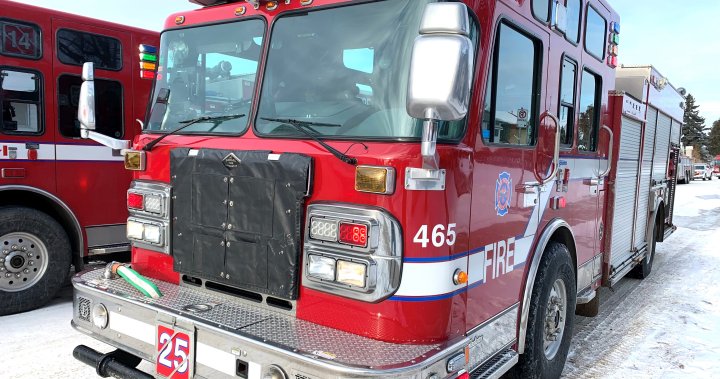Edmonton Fire Rescue Services is about to implement a four-point plan in an effort to bring down the number of medical calls firefighters are sent to.
In 2023, the department responded to 95,496 calls for service. Of those, 69 per cent were medical calls rather than fires or other emergencies.
Between 2018 and 2023, that represented an 82 per cent increase in medical calls for Edmonton firefighters.
In comparison, 62 per cent of calls Calgary firefighters responded to were medical, 61 per cent in Toronto, 48 per cent in Vancouver and 20 per cent in Ottawa.
By 2024, EFRS expects to respond to up to 80,000 medical calls each year.
The calls include immediately life-threatening situations like cardiac or respiratory arrests, time-critical calls like chest pain or overdoses, urgent but potentially serious calls, and non-urgent calls.
About 31 per cent of the medical calls EFRS responded to in 2023 were found to not be immediately life-threatening or time-critical.
In 2017, Edmonton firefighters started administering naloxone in an effort to help reverse drug poisonings.
Between 2018 and 2023, the number of drug overdose and poisoning calls Edmonton firefighters responded to skyrocketed, jumping by 790 per cent.
The email you need for the day’s
top news stories from Canada and around the world.
The email you need for the day’s
top news stories from Canada and around the world.
Beginning at the end of March, EFRS will begin to implement a four-point plan in an effort to ease that workload.
Starting on March 31, the lift assist protocol will be revised to more closely match the Calgary Fire Department’s.
Edmonton firefighters will only have to respond to lift assists when paramedics need time-critical help or when all other EMS resources are tied up.
Then, beginning May 1, Edmonton firefighters will only be automatically dispatched to medical events once they are deemed immediately life-threatening. That is meant to reduce the number of times firefighters are driving around mid-call when it’s determined they aren’t needed.
Also on May 1, the types of medical calls EFRS respond to will be changing, reducing the number of not immediately life-threatening calls a fire crew is sent to.
The fire department consulted staff and worked with Alberta Health Services to determine those calls, aligning them with the service levels of the Calgary and Vancouver fire departments.
That move is expected to reduce EFRS’ medical call volume by 31 per cent.
Then, in June, EFRS will go to fewer medical calls at certain locations.
The fire department has worked with AHS to identify 33 high-call-volume locations which it believes already have medical staff and equipment on site, so firefighters may not be needed.
Once the plan is implemented, there will be an ongoing evaluation to make sure service levels are being met.
“I just wonder, with some of the action items that are noted in the report, if people’s safety is going to be at risk,” Coun. Jo-Anne Wright told Global News Monday.
She made the motion requesting the report and says it lacks information, including the financial burden the City of Edmonton is shouldering to send firefighters to so many medical calls.
Wright expressed concern especially with the notion that firefighters will attend fewer lift assist calls. She said she is worried that could leave vulnerable people, including seniors, lying around waiting for help.
“I don’t know — if when they’re being dispatched, and when the dispatchers are speaking to people — if they’re understanding the underlying causes for that fall.”
The changes come as EFRS deals with an overall increase in call volume, especially since 2020, which has come with a huge increase in operating spending.
EFRS has seen a 45.6 per cent increase in fuel use and a 100.8 per cent increase in fuel costs.
According to a report set to be presented to the city’s community and public services committee Monday, the changes will not mean an increased risk to the public. It says people will continue to receive an ambulance or alternative as determined by AHS dispatch.
When asked about the report, Mayor Amarjeet Sohi told reporters it was a result of the province “underfunding” EMS services in Alberta.
Sohi said that has resulted in work being downloaded onto firefighters and that there needed to be discussions with the provincial government about the effects of that.
© 2024 Global News, a division of Corus Entertainment Inc.


